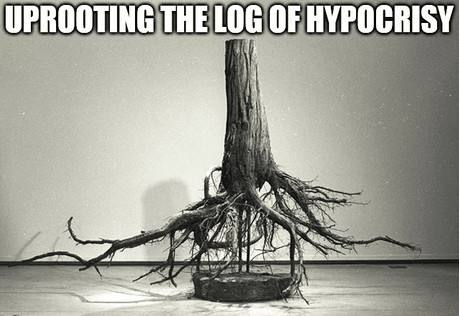⏱️ Estimated Reading Time: 3 min read
“You hypocrite, first take the log out of your own eye, and then you will see clearly to take the speck out of your brother’s eye.” (Matthew 7:5)
I have been thinking quite a bit lately about hypocrisy. It is something for which I cry foul when it comes to the actions of others, but yet I seem to fail at identifying my own trials with this pernicious approach to life. As such, I was reminded of the words of our Messiah in Matthew 7:5, specifically the exhortation to remove the log in my own eye before trying to pinpoint a speck in another’s eye.
What exactly is hypocrisy? The standard dictionary definition is “the practice of claiming to have moral standards or beliefs to which one’s own behavior does not conform.” A biblical definition is rooted in both one who worships God on the outside, yet inwardly has a heart far from God. Additionally, a hypocrite is defined as one who puts on a performance, a show if you will of loving God but doing anything but that from the perspective of godly character and inward purity.
A hypocrite is a fake. A hypocrite is one who is included in the category of the ungodly. God detests this type of behavior. Steven Cole aptly notes that hypocrisy is “one of the most subtle and dangerous of sins.”[1] The subtlety of hypocrisy is such that in the end, as noted by Jesus in Matthew 7:5, the hypocrite ignores the log that has grown in their eye.
Think about that for a second. A metaphorical tree has grown in their eye. This tree was likely not a transplant. It was planted as a seed, was water, and grew up to a size worthy of being labeled as a log. Little by little, this tree arose in the eye of the hypocrite. While large in size (at least compared to the speck being investigated by the hypocrite in the life of another), the hypocrite seemingly is unaware of the log in their eye. What a sad state of affairs.
While sad, I submit many of us to include myself have logs of hypocrisy growing in our lives. We water and care for these seeds of hypocrisy each time we maintain an outward appearance of godliness yet refrain from truly being obedient to the Father’s commands.
This issue of hypocrisy is one I am focusing on of late in my own life. Countless times I have stated I affirm something as true yet abstained or tried to find excuses from being truly obedient in my actions to what God has commanded.
Dealing with hypocrisy is not easy. We become comfortable in our hypocrisy as it is painful to admit this failure and it is hard to remove the log from our own eyes. However difficult, it is a must, not so we can pick out the speck in another’s eye, but so that we can do what we claim we are to be doing, namely being obedient children of God.
Do not merely trim the branches of hypocrisy. Completely uproot it.
References:
[1] Steven Cole, “Lesson 12: What Hypocrisy Does (Romans 2:17-24),” Bible.org, June 4, 2013, accessed June 19, 2017, https://bible.org/seriespage/lesson-12-what-hypocrisy-does-romans-217-24.



